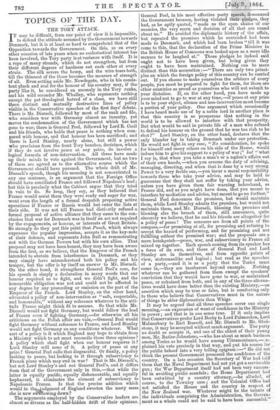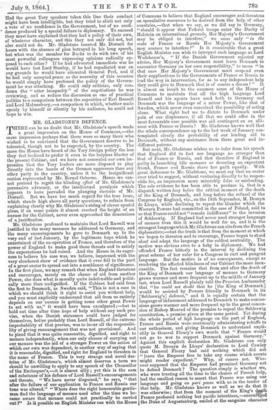tude France might think fit to assume. So that while
Mr. It may be argued that all three speeches cover one single Disraeli would not fight Germany, but would follow the lead meaning,—an expression of want of confidence in the Ministry of France even if fighting Germany,—for otherwise all his in power; and that is in one sense true. If it only implies enticuuns on the Polish affair are vain,—General Peel would that Conservatives prefer Lord Derby to Lord Palmerston, Lord fight Germany without reference to France, and Lord Stanley Malmesbury to Earl Russell, and Mr. Disraeli to Mr. Glad- would not fight Germany on any conditions whatever. What stone, it may be accepted without much argument. The party sort of a policy is it which England may hope to obtain from no doubt so accepts it, and one of the ablest of their young a Ministry which to act must reconcile those three opinions ? men, Mr. Butler-Johnstone,—who has about as much business A policy which shall fight when our honour requires it? among Tories as he would have among Illtramontanes,--zx- Lord Stanley will none of it. A policy of peace at any plained his vote precisely in that way, and put his reason for . price ? General Peel calls that disgraceful. Or finally, a policy the public behoof into a very telling epigram :—" He did not looking to peace, but looking to it through subserviency to think the present Government possessed the confidence of the French plans which may end in war? That is Mr. Disraeli's, country. On a late occasion the Secretary of War had told but not Lord Stanley's and not General Peel's, and it differs them that the Naval Department had not yet got a serviceable from that of the Government only in this,—that while the gun ; the War Department itself had not been very success- latter is equally pacific, equally dishonourable, and equally ful in avoiding public scandals ; the Home Department had haphazard, it eliminates the element of subserviency to been outwitted by a country attorney,—he alluded, of Napoleonic France. Is that the precise addition which course, to the Townley case ; and the Colonial Office had would in thgaiudgment of England sweeten the nasty mess not satisfied the House and the country in respect of she is now 8M/flowing down? the New Zealand war. Whatever might be the talents of The arguments employed by the Conservative leaders are the individuals comprising the Administration, the Govern- almost as diverse as the half-hidden drift of their opinions. meat as a whole could not be said to have been Auccessful."' General Peel, in his most effective party speech, denounced TOPICS OF THE DilkY• the Government because, having violated their pledges, they had, as he aptly quoted, " made us the open shame of our THE TORY ATTACK. enemies, the very scorn and derision of all that are round IT may be difficult, from our point of view it is impossible, about W." He avoided the diplomatic history of the affair, to defend the attitude assumed by the Government towards but repeated the promises which he contended had been Denmark, but it is at least as hard to comprehend that of the made to Denmark, and which had been broken " till it was Opposition towards the Government. On this, as on every come to this, that the declaration of the Prime Minister in other occasion of late years when no ecclesiastical interest has the British House of Commons was looked upon as a mere idle been involved, the Tory party is at variance with itself. It is menace to be laughed at." Those pledges be indeed said a rope of many strands, which do not strengthen, but from ought not to have been given, but being given they their different degrees of hardness cut each other at every ought to have been maintained. Nothing can be more strain. The silk severs the hemp, and the wire tears both, distinct than this accusation :—" There are only two princi- till the thinnest of the three becomes the measure of strength pies on which the foreign policy of this country can be carried of all. Even setting aside Mr. Newdegate, who in his consis- out. If you choose to make yourselves the arbiters of every tent pluck and zeal for the honour of his country may, if the people, you must be prepared to fight for them, for there are party like it, be considered an anomaly in the Tory ranks, other countries as proud as yourselves who will not submit to and his wild seconder Mr. Whalley, who represents nothing your dictation. If, on the other hand, you have made up except the pet theological hatred of a class, we have still your mind not to go to war at any time,—if peace at any price three distinct and mutually destructive lines of policy is to be your object, silence and non-intervention must become visible in the Conservative speeches of the first days' debate. a portion of your policy. One argument which occasionally There is Mr. Disraeli, followed by most of the rank and file, I have heard made use of by a noble lord in another place is who considers war with Germany almost an insanity, yet that this country is so prosperous that nothing in the moves the condemnation of the Government which has not world is to be allowed to interfere with that prosperity. gone to war; there is General Peel, followed by Lord R. Cecil But what would be said in private life of a man who refused and his friends, who holds that peace is nothing when corn- to defend his honour on the ground that he was too rich to be pared with honour, and that honour has been sacrificed; and shot?" Lord Stanley, on the other hand, declares that the there is Lord Stanley, nearly alone, but still a power only blunder lay in taking Denmark under our protection. who proclaims from the front Tory benches, doctrines, which He would not fight in any case, "No consideration, he spoke if they do not involve peace at any price, do involve a for himself and many others on his side of the House, would logical formula of non-intervention. All three have made induce him to give his support to a policy of war;" but "what up their minds to vote against the Government, but no two I say is, that when you take a man's or a nation's affairs out of them are agreed as to the alternative course which the of their own hands,—when you assume the duty of advising, Government should have pursued. The whole drift of Mr. managing, directing, and when that is done by a very strong Disraeli's speech, though his meaning is not concentrated in Power to a very feeble one,—you incur a moral responsibility any one sentence, is an argument that the Foreign Office towards those who take your advice, and may be held to should have conciliated France and followed Napoleon's lead; guarantee that they shall not suffer by taking your advice, but this is precisely what the Cabinet argue that they tried unless you have given them fair warning beforehand, as in vain to do. So long, they say, as they believed that France did, and as you might have done, that you meant to France would assist them they were ready and eager for war, interfere by mediation and advice, but meant to go no further." went even the length of a formal despatch proposing active General Peel denounces the promises, but would maintain operations if France or Russia would but enter the .lists at them, while Lord Stanley admits the promises, but would not their side. It was not till France had distinctly refused a maintain them, and Mr. Disraeli, blaming the promises and. formal proposal of active alliance that they came to the con- blaming also the breach of them, still announces, quite elusion that war for Denmark was in itself an act not required sincerely we believe, that he and his friends are altogether for by the engagements, or honour, or interests of Great Britain. a policy of peace ! The censures are from all points of the So strongly do they put this point that Punch, which always compass,—for promising at all, for promising and refusing to expresses the popular impression, accepts it as the key-note accept the hazard of performing, and for promising and not of their defence, and represents John Bull as remonstrating fulfilling without the promised war; and the proposals are a - not with the German Powers but with his own allies. That mere hotchpotch—peace, war, and subserviency to France all proposal may not have been honest, they may have been aware mixed up together. Each speech coming from its speaker has from the first, as we believe, that the Emperor of the French a force of its own, and those of General Peel and Lord intended to abstain from interference in Denmark, or they Stanley are in themselves, and from opposite points of may simply have misunderstood both his policy and his view, statesmanlike and logical ; but read as the speeches temper, but the offer is by itself an answer to Mr. Disraeli. of a party,—and it is as a party that the Tories must On the other hand, it strengthens General Peel's case, for come in,—they are incoherent beyond example. Nothing his speech is simply a declaration in many words that our whatever can be gathered from them except the speakers' honour required us to fight, and we didn't fight, and the conviction that they would have gone to war, or maintained honourable obligation was not and could not be affected in peace, or refrained from both, and in any of the three alterna- any degree by any proceeding or omission on the part of the tives would have done better than the existing Ministry,—an Emperor of the French. Lord Stanley, on the other hand, assertion which may be true or false, but is comforting only advocated a policy of non-intervention as "safe, respectable, to those who believe that Conservatives must in the nature and honourable," without any reference whatever to the atti- of things be abler diplomatists than Whigs. Had the great Tory speakers taken this line their conduct might have been intelligible, but they tried to elicit not only a vote of no confidence in the Government, but of no confi- dence produced by a special failure in diplomacy. To succeed they must have explained that they had a policy of their own, of whatever character, and this they not only did not, but also could not do. Mr. Gladstone taunted Mr. Disraeli for hours with the absence of plan betrayed in his long speech, but what was the member for Bucks to do with two of his most powerful colleagues expressing opinions radically op- posed to each other ? If he had advocated immediate war he would have lost Lord Stanley, if he had repudiated war on any grounds he would have alienated General Peel, and if he had only accepted peace as the necessity of this occasion he would simply have professed the policy of the Govern- ment he was attacking. He could only criticize, only con- demn the "utter incapacity" of the negotiations he was reviewing, and so reduce the discussion as one of practical politics to a comparison between the capacities of Earl Russell and Lord Malmesbury,—a comparison in which, whether made openly by himself or silently by his audience, he could not hope to win.































 Previous page
Previous page